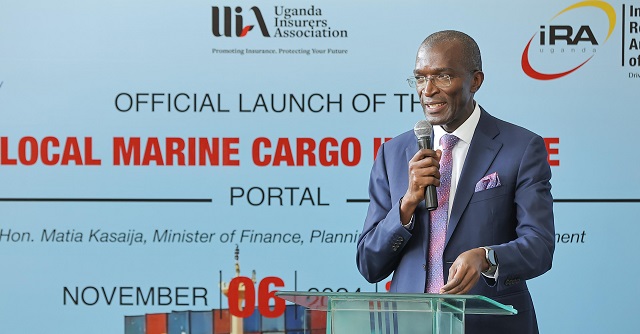
To allow users time to adapt, the government has set a compliance deadline of December 31, 2024
Kampala, Uganda | THE INDEPENDENT | Uganda’s insurance regulator, Insurance Regulatory Authority of Uganda (IRA), in partnership with the Uganda Revenue Authority (URA), has launched an integrated online platform dedicated to marine and goods-in-transit insurance.
The new system allows local importers to secure insurance from Uganda-based providers, effectively retaining revenue in the country, simplifying claims processes, and reducing operational costs for businesses.
IRA Chief Executive Officer, Kaddunabbi Ibrahim Lubega, hailed the platform as a transformative milestone in Uganda’s trade and insurance sectors, underscoring that the online tool will provide significant benefits to importers and local insurers alike.
Traditionally, importers relied on foreign insurers for marine cargo insurance, leading to substantial capital outflow and often complicated claims processes.
With the new system, local insurers will offer the insurance component of Cost Insurance and Freight (CIF), enabling Ugandan importers to obtain competitive insurance rates in local currency.
This shift not only boosts the local insurance industry but also aligns with Section 8(3) of the Insurance Act, 2017, which mandates procuring marine policies from Uganda-based insurers.
“This online platform empowers Uganda’s insurance sector, ensuring that our financial resources are reinvested within our economy,” Kaddunabbi said on Nov.06, noting that importers can now manage insurance needs through a streamlined, locally accessible system.
Portal linked to other URA systems
The portal is integrated with the Uganda Electronic Single Window, enhancing collaboration between the IRA, URA, and other key stakeholders. This synergy simplifies and improves the delivery of insurance services, fostering a more efficient, self-sustaining economy.
Henry Musasizi, the mnister of State for General Duties at the Ministry of Finance, Planning, and Economic Development, who was represented by Permanent Secretary and Secretary to the Treasury Ramathan Ggoobi, reiterated the government’s commitment to supporting local insurance firms.
The move, Musasizi stated, aligns with a 2017 directive aimed at empowering Uganda’s domestic insurance providers to cater to local insurance needs.
He acknowledged challenges previously faced by importers—such as delays in claims, high costs in managing claims with foreign providers, and concerns over coverage verification.
By retaining insurance premiums within Uganda’s borders, the government anticipates a positive economic impact, which includes increased liquidity and enhanced revenue through locally collected VAT and stamp duties.
In addition to these benefits, the platform has been designed to resolve numerous operational challenges voiced by Ugandan businesses, such as clarity in insurance charges and confirmation of authentic insurance coverage.
The integration of URA systems, including ASYCUDA and e-tax, ensures that importers can securely manage their policies with ease. A consortium of 20 non-life insurance companies has been established, pooling resources to provide marine coverage, backed by actuarial reviews confirming the sector’s readiness to meet these demands.
The government is optimistic that the platform’s launch will create a favorable environment for negotiating suitable coverage terms and premium rates and expects that, over time, the scale of the pool will drive economies of scale for marine insurance.
Compliance starts in January 2025
To allow users time to adapt, the government has set a compliance deadline of December 31, 2024. Starting January 1, 2025, all imports will be required to be insured locally, and non-compliance will be subject to legal action according to Musasizi.
Despite the anticipated challenges inherent in any new system, the IRA and URA remain committed to ensuring smooth implementation, with an emphasis on educating users on the benefits of local marine insurance. The government also hopes the system will increase insurance literacy and foster greater resilience within Uganda’s trade ecosystem.
In addition to government officials, leaders from prominent international insurance associations praised Uganda’s initiative, underscoring the importance of marine insurance as a cornerstone of global trade.
As Kaddunabbi summarized, “Marine insurance is the anchor of global trade, safeguarding businesses against unpredictable risks, enabling them to navigate confidently into new markets.”
Musasizi said, “We are also aware of the Capital flight and revenue loss that the government was facing through insurance of imports by foreign insurers. We have noted from the Inter-Government Standing Committee on Shipping (ISCOS) Report of 2015 that between 2009 and 2013, the government lost revenue of UShs60.3bn as VAT and Shs35bn as Stamp duty through insurance of imports by foreign insurers. This is in addition to the massive insurance premium flight. With an increase in imports over the years, the country has certainly lost more revenue.”
Thus, the new platform represents a significant step in Uganda’s journey toward enhanced trade facilitation and a robust local insurance sector, reinforcing national efforts to build a resilient economy that fosters local industry growth.
 The Independent Uganda: You get the Truth we Pay the Price
The Independent Uganda: You get the Truth we Pay the Price



